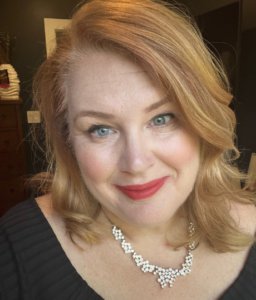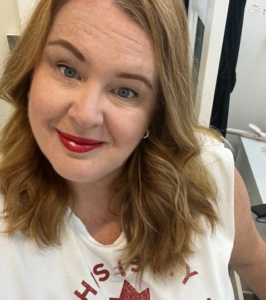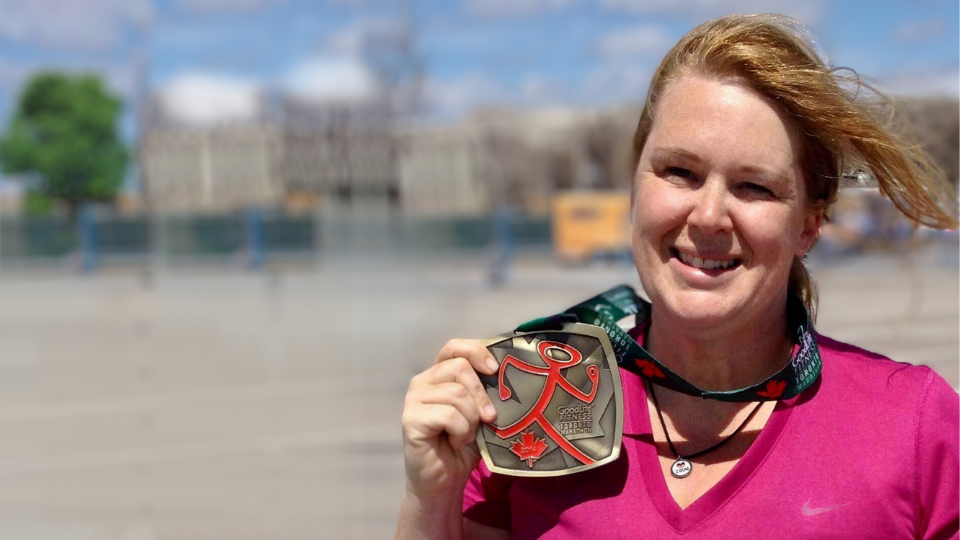By: Maria Fleet
“I just wish I could go back and tell my nine-year-old self or my 19-year-old self what I know now,” says 49-year-old Suzanne, wearing bright red lipstick and sitting in front of a bold polka-dot background.
For the past six months, Suzanne has been on a brand new life-changing path, after battling with her weight for as long as she can remember.
Since discovering a new center in Canada that treats obesity medically and holistically, her only regret is she can’t turn the clock back to explain all she’s learned to her younger self.
“Because [I] was always told by medical professionals, by weight loss professionals, by personal trainers, by psychologists, and well intended others, ‘Can’t you just get your shit together?’” she continues.
But a video she was shown really clicked. It explained how hormones in the brain affect the human drive for food, and for some people, those hormones are out of balance. This dysregulation can lead to uncontrolled thoughts of food, and disordered eating patterns that willpower alone can’t stand up to.
For Suzanne, it was like someone finally turned on the lights. It explained her. It wasn’t that she “couldn’t get her shit together,” she realized. “This is a condition I have. This isn’t a mistake I’ve made.”
Even though Suzanne can joke about it, – “I’ve been gaining and losing weight my whole life – mostly gaining,” she quips – the lifelong sense of failure has been a deep psychic wound.
She was a chronic member of Weight Watchers from adolescence. Looking back at photos, she says, “I wasn’t even – like, I might have been fluffy, but I wasn’t even that overweight. But I wasn’t really, really thin.” She laughs that she quit and rejoined Weight Watchers so many times during the “cottage cheese and grapefruit halves” era that she should have bought stock in the place. In fact, she DID eventually buy stock in Weight Watchers! And, she actually had some success with the system – being that she lost 50 lbs. at one point around age 19 – by counting those well-known Weight Watchers points.

Suzanne, as a Child
It was blind white-knuckle restriction – with limited understanding of why or how it was working.
But when she went to college that fall, she still felt like “the fat girl.” As a size 10 or 12, (which she laughs she’d “kill” to be now) she felt judgment bearing down, including her own.
Suzanne says feeling bad about herself as a larger woman has strangely led to her success. It pushed her to be an overachiever. She’s built a career in sales and business development in the competitive tech sector. She’s brought up two almost-grown daughters as a single mom. She ran a marathon when she turned 40. She is president of the Board of Directors of a local non-profit in York Region, Ontario. And she has done all this, while being not very, very thin.
A HAPPY ACCIDENT
Her turning point came in February 2023, almost by accident.
“A business colleague is the sister of one of the founders of this clinic, and she posted it on LinkedIn and said, ‘I’m so proud of my sister. She’s starting her own business.’” Suzanne clicked the link. “It was a very happy accident,” she says now.
The first thing Suzanne read on the site was: “We treat obesity as a complex medical condition.” That piqued her interest. “Doctors focused on obesity was a big green light for me,” Suzanne remembers. “I didn’t know they existed.” Her weight was at an all-time high, she says. “It was starting to impact my life socially, and probably professionally, if I’m totally honest… and I was getting scared for my health.”
She first had to do a number of intake assessments, some written and some part of an intake interview. She was assessed for anxiety, depression and ADHD. They asked about her sleep, and her family situation. “They just did a whole 360 view on like who Suzanne is,” she describes.
DECADES OF SHAME MELTED AWAY
Her first appointment was with a registered dietitian, Michelle. Michelle told her something she’d never heard anyone say – “‘What if I told you it’s not your fault?’” Suzanne recalls. Suzanne pushed back. “I’m like, but it is my fault. And she’s like, ‘Suzanne, it’s not your fault.’ And then … I started to cry and I’m like, ‘But Michelle, I put the food in my mouth. It’s my fault. I know what healthy eating is and isn’t, logically.” She blinks back tears at the memory.
Then she watched that transformative video about the way food and hunger are regulated in the brain. As she describes it, all the guilt and feelings of failure melted away in ten minutes.
Through the center, Suzanne’s learned other things about herself. “I was diagnosed with a raging case of ADHD, which again, was not spotted or really addressed by my traditional medical and psychological care that I’d had historically… I’m treating that with medication which has turned off a lot of the chaos in my brain.”
The way she describes it is compelling: “If your brain is a web browser, you’ve got 25 tabs going on. 15 of them are playing different kinds of music. It’s like jazz, like there’s no beat. It’s chaos. The saxophones are fighting with the guitars.” ADHD medication has calmed her brain down so she can have more focus.

She realizes now that she used food to help anchor herself from the chaos of her thoughts. “If I was going into a hard meeting, I’d have a sandwich. If I came out of a hard meeting, I’d have a cookie. And it was a constant thing, and I was just using food as that anchor to get through the chaos.” Now, she can walk back to her office from a busy day of meetings, through the train station and past the ice cream shop without giving in to impulse. She describes it as having a clarity of mind to make the right choices, as having additional space to decide.
The therapies provided by the center, including cognitive behavioral therapy and weight loss medication, all work in conjunction to calm down Suzanne’s “food brain.”
“I have coaching from a dietician, support from a doctor, education on what’s driving it, and then some intervention with medicine. That food voice is turned off a little bit. And now I can make logical, informed, healthy choices for myself. I was cognitively and physically not capable of that six months ago,” she explains.
Experiencing that control has given Suzanne a newfound confidence. “I don’t feel like a failure anymore,” she says. “That defeat is gone.” As far as goals are concerned, in this program, there’s no stigmatizing weigh-in. “The behavior is the goal. Making healthy choices … having a consciousness about monitoring my own nutrition, a consciousness about really understanding when I’m hungry, when I’m not, and eating until moderately satisfied and then stopping,” she says. She’s also conscious of keeping her blood pressure in a normal range.
And it doesn’t mean she has to give up everything she loves.
“I still have bread. I’m not giving up bread. I love bread. I love bread!” She says she used to fight her love of bread, sometimes trying not to eat it for a week. “Then, like, you know, by noon on Monday was face down in a bunch of bread!” because she couldn’t stop thinking about it. That doesn’t happen so much anymore. She keeps a journal, and just stays aware of what and how much she’s eating. That works for her. “If I bite it, I write it!” she declares. She can still luxuriate in gelato a few times a week in the summer from her favorite nearby spot. She plans for it.
Suzanne hopes other people like her will be moved to find a weight management program that is medically managing obesity. (Find one near you here.)
“It really, truly has changed my life,” Suzanne says earnestly. “It’s a very personal subject and I’m sure some people think I’m crazy for doing a public interview about it like this, but my God, you see women and you can feel it on them – the shame and the angst of carrying extra weight – and I thought, if one [other] person can have that light switch go off, it’s worth it to me.”

***
Diet and exercise alone aren’t enough to help many people reach a healthier weight. Medical treatments are needed to address the biological changes happening in our bodies that can drive weight regain. To find a physician near you who specializes in weight management, click here.
Get a weekly text to help you stay on track with your health goals! Click here to sign up.
This article was sponsored by Novo Nordisk Canada. All content is created independently by My Weight – What To Know with no influence from Novo Nordisk.

